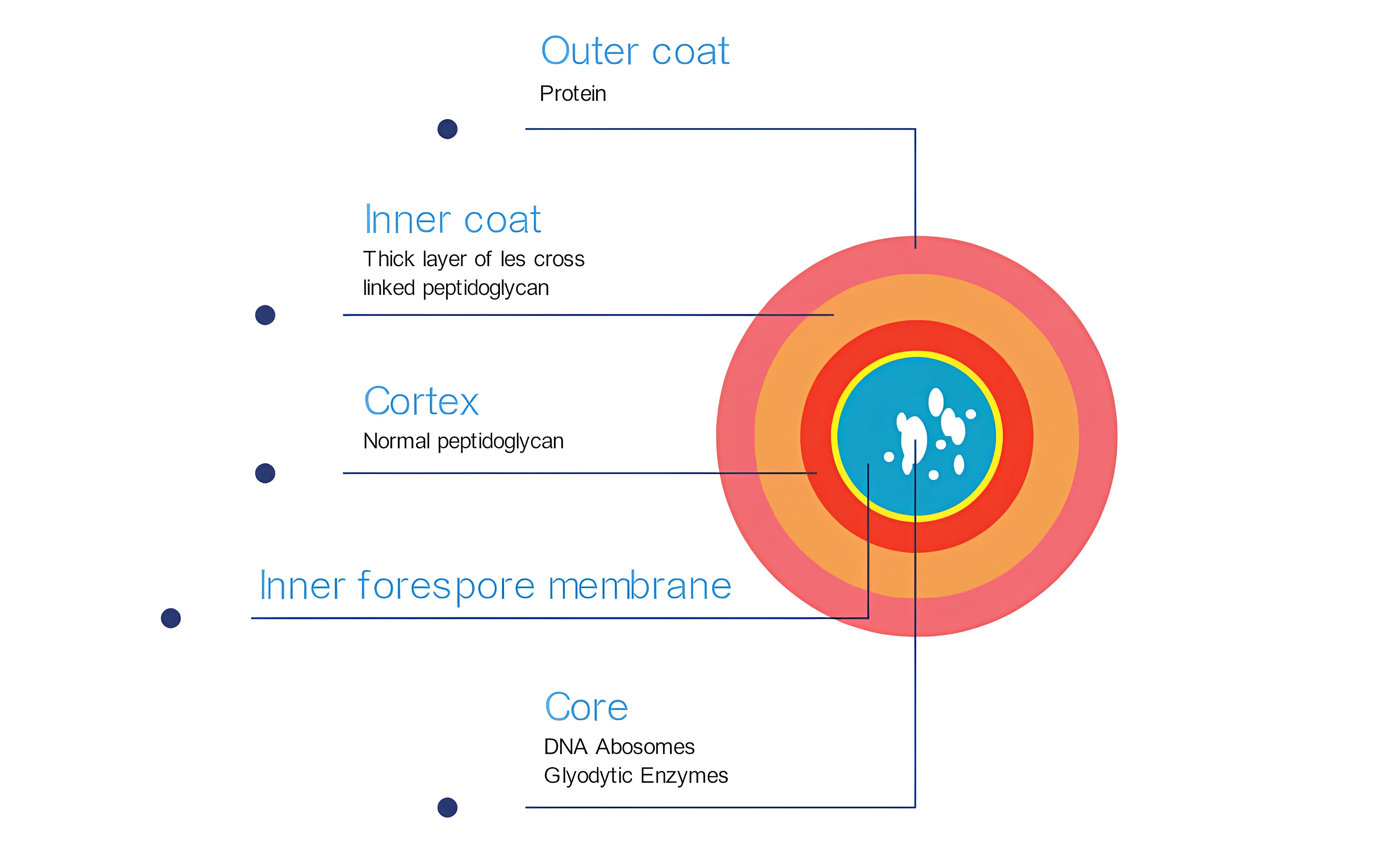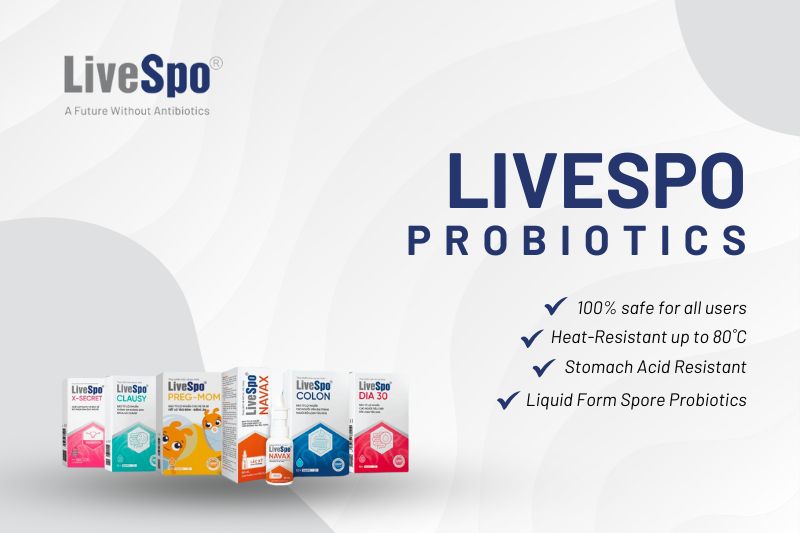What are Spore Probiotics? Are they better than Regular Probiotics?
Probiotics play a key role in human well-being by nurturing the body’s microbiome. You can find them in many products, from yogurt to supplements claiming to boost your digestion by balancing gut bacteria. You’ve likely seen the claims – better digestion, improved gut health, and a stronger immune system – all thanks to the friendly bacteria these products contain.
But here’s something that might surprise you: most of these probiotics never actually make it to your stomach because of the acidic environment. That’s where Spore Probiotics come in – a more advanced and effective alternative.
But what exactly are Spore Probiotics, and how might they outperform regular ones? Let’s learn more in this blog!
What Are Probiotics?
Probiotics are living microorganisms, bacteria or yeasts, that provide health benefits when you consume them in the right amount. They naturally live inside our bodies, particularly in the digestive tract to keep our microbiome balanced. The gut microbiome is a complex ecosystem of trillions of bacteria, viruses, and fungi that live in the digestive tract. A healthy gut microbiome is important for digestion, immune function and even mental health.
Traditional probiotics usually come from the Lactobacillus and Bifidobacterium families. You can find these probiotics in fermented foods such as yogurt, kefir, sauerkraut, and kimchi as well as in nutritional supplements.
What Are Spore Probiotics?
Spore probiotics or soil-based probiotics are tiny organisms which are natively found in our soil. There are hundred species contained in the Bacillus genus but only a select few are used as probiotics, including Bacillus subtilis, Bacillus coagulans, Bacillus clausii, Bacillus pumilus, Bacillus licheniformis, Bacillus natto (subtilis), Bacillus polyfermentans, Bacillus cereus var. toyoi, and Bacillus cereus.
Let’s take a closer look at 3 noteworthy strains that have been the subject of recent research: Bacillus subtilis, Bacillus coagulans, and Bacillus clausii.
Bacillus coagulans MTCC 5856 (LactoSpore)
Bacillus coagulans MTCC 5856, also known as Lactospore, is a type of spore probiotics that produces lactic acid. Research has shown that this spore-forming probiotic can help with various digestive issues.
In one clinical study, Bacillus coagulans significantly reduced common symptoms of diarrhea-predominant IBS, including bloating, diarrhea, vomiting, abdominal pain and stool frequency.
Another study involving 40 participants with both IBS and major depressive disorder found that taking 2 billion CFUs of Bacillus coagulans MTCC 5856 daily for 90 days not only improved IBS-related quality of life but also had a positive effect on mood.
Bacillus Subtilis DE111
Bacillus subtilis DE111 is a well-researched probiotic strain known for its benefits in digestion and immune support. Traditionally used in fermented foods in Japan and Africa, this strain produces important enzymes like lipase, amylase, protease, and cellulase, which help break down fats, carbohydrates, and proteins for better nutrient absorption. Additionally, it can help break down gluten and common allergen foods like soy, egg, and dairy, potentially reducing food sensitivities.
Research also suggests that Bacillus subtilis is a natural part of the gut microbiome and plays a key role in digestive health. In a study of 50 people with occasional constipation or diarrhea, taking DE111 for 90 days helped regulate bowel movements and improve gut function.
This strain has also been proven to benefit newborns and children’s gastrointestinal and immunological health. A study of 91 children from 2 to 6 years old found that using DE111 for eight weeks increased the variety of the microbiome.
Bacillus clausii SC108 (Munispore)
Bacillus clausii SC108 is naturally found in whole grains and fermented foods. Although it is short-lived in nature, research has shown that it can cling to the gut epithelial lining by using adhesion-related proteins, allowing it to germinate in the GI tract before re-sporulating. Once in the gut, it has been found to push out pathogenic microorganisms, allowing beneficial bacteria to flourish.
One of Bacillus clausii’s standout abilities is its strong antioxidant capacity, which helps protect cells from damage and supports immune function. Antioxidants play a key role in protecting against free radicals that affect tight junctions and repair those junctions faster. In fact, its total antioxidant capacity (TAC) is significantly higher than that of the well-known probiotic strain Lactobacillus rhamnosus.
Bacillus clausii is different from other Bacillus strains by its capacity to modulate immunological responses. It also has natural resistance to penicillins and other drugs, making it safe to use alongside antibiotic therapy.
Why Spore Probiotics Outperform Regular Ones?
Spore probiotics work similarly to other probiotics, producing enzymes and active substances that prevent harmful organisms and support gut health. They also produce necessary nutrients such as vitamins, short-chain fatty acids, and antioxidants.
What differentiates spore probiotics is the existence of an outer spore coat that makes it tolerant to the heat and acid environment in the stomach. The spore’s coat also protects it from other reactive chemicals throughout the digestive tract. As a result, more viable probiotics are able to reach the distal gut and exert their effects.
However, when it comes to non-microshield probiotics, some studies showed that up to 99% of them are destroyed just within 30 minutes of exposure to the low pH conditions of the stomach. Leaving few (if any) that reach your intestines.
In short, spore probiotics stand out in several ways:
- They are highly stable and resistant to the low pH of stomach acid, allowing more usable probiotics delivered to the intestine.
- They have the ability to resist antibiotics.
- They are shelf-stable and do not need to be refrigerated.
- They can stay in the gut longer than regular probiotics. Spore probiotics can live in your gut for 3 to 4 weeks, compared to the 4 to 7 days typical of regular probiotics.
- They provide better outcomes, specifically for SIBO-type patients, compared to traditional probiotics like Lactobacillus.
The Unique Mechanisms Behind Spore Probiotics
Spore probiotics are the next generation of probiotics with unique working mechanisms that allow them to survive and multiply in the gut. Their durability comes from their structure with a condensed, inactive chromosome at the core, surrounded by multiple protective layers, including a solid protein outer coat.

These layers protect the spore against difficult conditions such as UV radiation, extreme heat (up to 80-85°C), hydrogen peroxide, solvents, and enzymes like lysozyme. The inactive internal spore’s environment allows it to remain in this state for an indefinite period. In fact, viable spores have been found in insects embedded in amber that are estimated to be around 28 million years old.
When the spore probiotics pass through the stomach barrier, they thrive, reproduce, and eventually generate new spores. During this process, they create beneficial compounds like antimicrobials, enzymes, and signalling molecules, which support gut health, aid digestion, and increase your immune system.
What Are The Benefits of Spore Probiotics?
Thanks to their effectiveness and stability, spore probiotics can help with a variety of health issues:
- Irritable Bowel Syndrome (IBS): Spore probiotics can reduce IBS symptoms like bloating, gas, and abdominal pain by balancing gut flora and reducing inflammation.
- Immune Support: They create a healthier gut environment, which supports your immune system to fight infections and reduce chronic disease risk. In fact, your gut has more immune cells than any other part of your body, accounting for 70% of your immune system.
- Digestive Health: Spore probiotics can improve overall digestive health by supporting the breakdown of food, increasing nutrient absorption, and reducing digestive issues like diarrhea and constipation.
- General Well-being: Your gut health has a profound impact on your overall well-being, influencing not just digestion but also mental clarity, skin health, and energy levels. Spore probiotics can play a key role in these perks by keeping a balanced gut microbiome.
- Cognitive Function: In recent years, researchers have discovered a relationship between cognitive function and a healthy gut flora, particularly in the elderly. Research into probiotics has shown that they may increase cognitive performance, which would be extremely advantageous to the elderly population.
How to Choose the Right Spore Probiotic
On the market, there are many options of probiotics with different strains. When looking for the best probiotics to improve your health issues, you should keep these key factors in mind:
Prioritize Quality and Efficiency
Quality is a key factor when selecting any product, and spore probiotics are no exception. You should look for items that have been third-party tested to ensure their safety, potency and purity. Certifications from renowned organizations, such as the FDA or Eurofins, can provide assurance that the product adheres to high standards.
Trust the Brand’s Reputation
The reputation of the brand behind the probiotic supplement is also an important consideration. You should choose a brand that is transparent about its sourcing, manufacturing processes, and scientific backing. Reputable companies often provide detailed information on their websites, including clinical studies, customer reviews, and expert endorsements.
Consult a Healthcare Professional
You should also consult a healthcare professional to make sure you’re choosing the right probiotic. They can provide recommendations based on your health situation, ensuring your probiotic choice aligns with your overall wellness goals.
Why LiveSpo’s Liquid Spore Probiotics Is a Game-Changer?
When it comes to spore probiotics, there are many brands to choose from. Each brand has its own formula so it’s important to select a brand that has scientific backing and a track record of efficacy. Among the spore probiotics on the market, LiveSpo Probiotics stands out for several unique characteristics:
- 95% Survival Rate in Stomach Acid: Unlike many probiotics that are destroyed by stomach acid, LiveSpo probiotics ensure that 95% of the probiotics survive, leading to better absorption and effectiveness.
- Heat-Resistant up to 80˚C: LiveSpo probiotics remain stable even at high temperatures, allowing you to store them at room temperature or blend them with milk, food, or other beverages without losing their potency.
- Liquid Form, Multi-Strained, and High Concentration: LiveSpo’s liquid form makes it easier to consume and ensures a higher concentration of probiotics. The multi-strain formulation offers a broader range of benefits, tailored to meet various health needs.
All our claims are backed by proven clinical trials, ensuring that you’re getting a product that is both effective and safe. You can find more details of our clinical trials here!
LiveSpo is the global leader in liquid spore probiotics research, development and manufacturing. Our products are built and clinically studied to support and enhance digestive health, immune support, respiratory wellness, vaginal health, baby health, and women’s health.

Making Spore Probiotics a Regular Thing!
Spore probiotics is a significant breakthrough in the probiotics industry that provides a more robust, resilient, and effective solution for gut health. While regular probiotics have their place, spore probiotics may be the better choice for those looking for a more effective and convenient solution.
Interested in partnering with LiveSpo to distribute our cutting-edge probiotic products in your country? Contact us today to explore B2B collaboration opportunities and together bring “A Future Without Antibiotics” to customers worldwide!
Reference:
- https://pubmed.ncbi.nlm.nih.gov/26922379/
- https://pmc.ncbi.nlm.nih.gov/articles/PMC6034030/
- https://journals.lww.com/jcsm/pages/default.aspx
- https://www.longdom.org/open-access/the-effect-of-embacillus-subtilisem-de111-on-the-daily-bowel-movement-profile-for-people-with-occasional-gastrointestina-36720.html
- https://brill.com/view/journals/bm/11/7/article-p611_1.xml
- https://pmc.ncbi.nlm.nih.gov/articles/PMC9962608/
- https://pubmed.ncbi.nlm.nih.gov/27291780/
- https://www.uclahealth.org/news/article/want-to-boost-immunity-look-to-the-gut
- https://www.mdpi.com/2072-6643/13/8/2514





